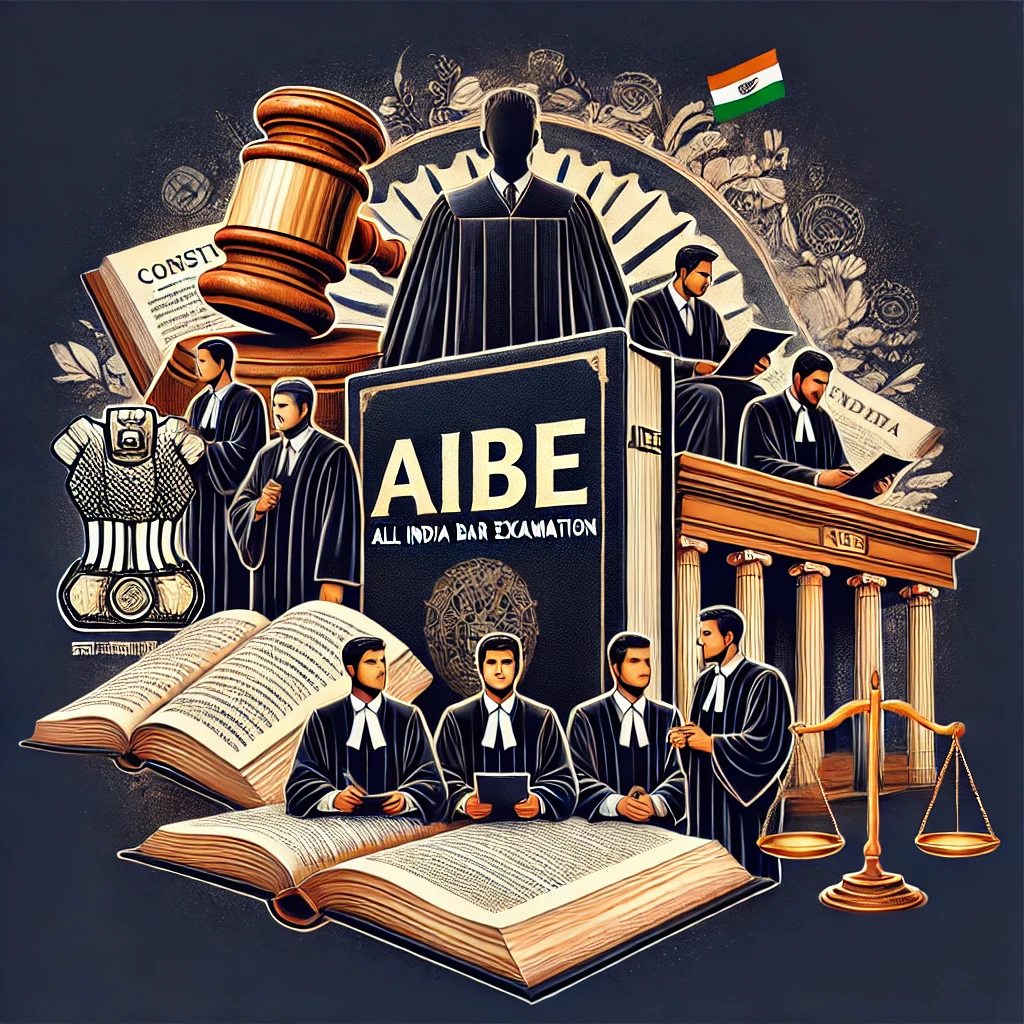AIBE Exam – 50 MCQs– BNSS / Criminal Procedure & Evidence
FIR / Complaint Stage
- FIR दर्ज करने का अधिकार किसके पास है?
a) Magistrate
b) Police
c) Advocate
d) Public Prosecutor
उत्तर: b) Police - Section 173 CrPC का संबंध किससे है?
a) Arrest
b) Information to Police
c) Bail
d) Evidence
उत्तर: b) Information to Police - Cognizable offences में FIR दर्ज करने की क्या विशेषता है?
a) Magistrate की अनुमति आवश्यक
b) Police स्वतः कार्रवाई कर सकती है
c) Court की अनुमति आवश्यक
d) None of the above
उत्तर: b) Police स्वतः कार्रवाई कर सकती है - यदि Police FIR दर्ज नहीं करती तो वादी क्या कर सकता है?
a) Magistrate से आदेश मांग सकता है (Section 156(3) CrPC)
b) Advocate से शिकायत कर सकता है
c) Police को ignore कर सकता है
d) None of the above
उत्तर: a) Magistrate से आदेश मांग सकता है - Section 175 CrPC का संबंध किससे है?
a) Non-cognizable offences
b) Recording of information in cognizable offences
c) Bail
d) Evidence
उत्तर: b) Recording of information in cognizable offences
Arrest & Remand
- Section 176 CrPC किस प्रकार के offences से संबंधित है?
a) Cognizable offences
b) Non-cognizable offences
c) Bailable offences
d) None of the above
उत्तर: b) Non-cognizable offences - Non-cognizable offences में Police को arrest करने से पहले क्या चाहिए?
a) Client consent
b) Magistrate की अनुमति
c) Court order
d) None of the above
उत्तर: b) Magistrate की अनुमति - Section 187 CrPC का संबंध किससे है?
a) Arrest procedure
b) Police investigation
c) Bail
d) Evidence recording
उत्तर: b) Police investigation - Arrest होने के बाद किस CrPC Section के तहत lawyer immediate application कर सकता है?
a) Section 437
b) Section 482
c) Section 484
d) Section 266
उत्तर: a) Section 437 - Arrest के समय accused का कौन सा अधिकार सुरक्षित होना चाहिए?
a) Right to consult lawyer
b) Right to refuse evidence
c) Right to judge appointment
d) None of the above
उत्तर: a) Right to consult lawyer
Cognizance by Magistrate
- Section 223 CrPC किस बारे में है?
a) Magistrate taking cognizance
b) Arrest procedure
c) Evidence submission
d) Bail
उत्तर: a) Magistrate taking cognizance - Section 230 CrPC Magistrate को क्या अधिकार देता है?
a) Complaint को dismiss करने का
b) Bail देने का
c) Arrest करने का
d) Evidence collect करने का
उत्तर: a) Complaint को dismiss करने का - Section 472 CrPC किससे संबंधित है?
a) Anticipatory bail
b) Arrest procedure
c) Bail during trial
d) Police investigation
उत्तर: c) Bail during trial - Complaint dismissal के मुख्य कारण क्या हो सकते हैं?
a) Facts की कमी
b) Legal point की clarity
c) Wrong drafting
d) All of the above
उत्तर: d) All of the above - Cognizance लेने के लिए कौन सी आवश्यक है?
a) Written complaint या FIR
b) Witness statement
c) Advocate submission
d) None of the above
उत्तर: a) Written complaint या FIR
Bail & Anticipatory Bail
- Section 482 CrPC किसके लिए है?
a) Arrest
b) Anticipatory Bail
c) Evidence collection
d) Complaint dismissal
उत्तर: b) Anticipatory Bail - Section 484 CrPC किससे संबंधित है?
a) Prosecution evidence
b) Bail in Bailable / Non-bailable offences
c) Cross-examination
d) Magistrate cognizance
उत्तर: b) Bail in Bailable / Non-bailable offences - Anticipatory bail कब लागू होती है?
a) Arrest होने के बाद
b) Arrest होने से पहले
c) Trial के दौरान
d) Investigation शुरू होने पर
उत्तर: b) Arrest होने से पहले - Non-bailable offences में bail किसके discretion पर होता है?
a) Police
b) Magistrate
c) Advocate
d) Public
उत्तर: b) Magistrate - Bail hearing में किन तथ्यों पर ध्यान देना चाहिए?
a) Offence की गंभीरता
b) Accused का social status
c) Risk of absconding
d) All of the above
उत्तर: d) All of the above
Evidence & Examination
- Section 266 CrPC किससे संबंधित है?
a) Prosecution Evidence
b) Cross-examination
c) Arrest
d) Bail
उत्तर: a) Prosecution Evidence - Section 272 CrPC किससे संबंधित है?
a) Witness recording
b) Cross-examination
c) Arrest procedure
d) Complaint dismissal
उत्तर: b) Cross-examination - Cross-examination का मुख्य उद्देश्य क्या है?
a) Witness credibility challenge करना
b) Evidence collect करना
c) Complaint draft करना
d) Arrest करना
उत्तर: a) Witness credibility challenge करना - Prosecution evidence की validity कौन तय करता है?
a) Police
b) Magistrate / Court
c) Advocate
d) Witness
उत्तर: b) Magistrate / Court - Evidence admissibility का आधार क्या होता है?
a) Section 173 FIR
b) Indian Evidence Act
c) CrPC Section 482
d) Section 484
उत्तर: b) Indian Evidence Act
Miscellaneous / Practical Knowledge
- FIR में गलत जानकारी देने पर क्या हो सकता है?
a) Case dismiss
b) Legal consequences for complainant
c) Delay in investigation
d) All of the above
उत्तर: d) All of the above - Non-cognizable offences में immediate arrest करने पर क्या होगा?
a) Legal
b) Illegal
c) Court discretion
d) None of the above
उत्तर: b) Illegal - Cognizable offences की arrest में magistrate approval चाहिए?
a) Always
b) Never
c) Sometimes
d) Depends on offence
उत्तर: b) Never - Section 161 CrPC का उपयोग किसके लिए होता है?
a) Witness examination by Police
b) Magistrate’s order
c) Bail application
d) Complaint dismissal
उत्तर: a) Witness examination by Police - Anticipatory bail को court किस आधार पर reject कर सकता है?
a) False implication claim
b) High risk of flight
c) Minor offence
d) Witness presence
उत्तर: b) High risk of flight
Additional MCQs (31–50)
- Magistrate cognizance लेने के लिए क्या आवश्यक है?
a) Police report या complaint
b) Advocate argument
c) Witness list
d) None of the above
उत्तर: a) Police report या complaint - Arrest के बाद lawyer का सबसे पहला कार्य क्या है?
a) Bail application
b) Evidence preservation
c) Client की legal advice
d) None
उत्तर: c) Client की legal advice - Section 173 का पालन नहीं करने पर police पर क्या कार्रवाई हो सकती है?
a) Legal proceedings
b) Suspension
c) Magistrate warning
d) All of the above
उत्तर: d) All of the above - Non-bailable offences में accused के पास कौन सा option है?
a) Automatic bail
b) Apply for bail to Magistrate
c) Ignore arrest
d) None
उत्तर: b) Apply for bail to Magistrate - FIR को delay करने पर क्या effect होगा?
a) Case weak हो सकता है
b) Arrest illegal
c) Bail deny
d) All of the above
उत्तर: a) Case weak हो सकता है - Cross-examination में contradictions पर focus क्यों?
a) Witness credibility challenge करने के लिए
b) Evidence collect करने के लिए
c) Complaint draft करने के लिए
d) None
उत्तर: a) Witness credibility challenge करने के लिए - Section 482 CrPC किसे safeguard करता है?
a) Magistrate
b) Police
c) Accused
d) Advocate
उत्तर: c) Accused - Bail hearing में mitigating factors में क्या शामिल होता है?
a) Social standing
b) Family background
c) Health condition
d) All of the above
उत्तर: d) All of the above - Cognizable offences में Police की primary responsibility क्या है?
a) FIR दर्ज करना और Investigation करना
b) Bail देना
c) Complaint dismiss करना
d) Evidence cross-examine करना
उत्तर: a) FIR दर्ज करना और Investigation करना - Non-cognizable offences की arrest की legality किससे तय होती है?
a) Police
b) Magistrate
c) Court
d) Witness
उत्तर: b) Magistrate - Section 230 CrPC के तहत complaint dismissal का main ground क्या है?
a) Lack of sufficient facts
b) Arrest illegal
c) Bail issue
d) Cross-examination
उत्तर: a) Lack of sufficient facts - FIR में कौन-सी जानकारी सबसे जरूरी है?
a) Scene of crime
b) Persons involved
c) Time & date
d) All of the above
उत्तर: d) All of the above - Section 484 CrPC में Bailable offence का मतलब?
a) Automatic bail possible
b) Magistrate discretion
c) Non-bailable
d) None
उत्तर: a) Automatic bail possible - Arrest के दौरान accused को क्या rights प्राप्त हैं?
a) Consult advocate
b) Remain silent
c) Medical examination
d) All of the above
उत्तर: d) All of the above - Section 266 CrPC का मुख्य focus क्या है?
a) Prosecution Evidence
b) Arrest procedure
c) Bail
d) Complaint dismissal
उत्तर: a) Prosecution Evidence - Cross-examination का legal base कौन देता है?
a) Section 272 CrPC
b) Section 173 CrPC
c) Section 484 CrPC
d) Section 482 CrPC
उत्तर: a) Section 272 CrPC - Evidence admissibility के लिए मुख्य act कौन सा है?
a) CrPC
b) Indian Evidence Act
c) BNSS
d) None
उत्तर: b) Indian Evidence Act - Magistrate का discretion किन मामलों में ज्यादा होता है?
a) Bail in non-bailable offences
b) FIR registration
c) Evidence collection
d) Complaint filing
उत्तर: a) Bail in non-bailable offences - Investigation में lawyer का primary role क्या है?
a) Client protection and legal advice
b) Evidence collection
c) Witness drafting
d) Magistrate argument
उत्तर: a) Client protection and legal advice - BNSS Sections का practising advocate के लिए ultimate purpose क्या है?
a) Case strategy और client protection
b) Arrest करना
c) Witness control
d) Evidence destroy करना
उत्तर: a) Case strategy और client protection

